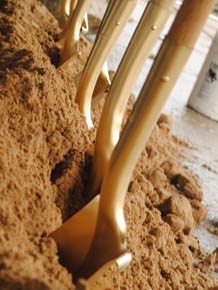Local governments, contaminated properties and Brownfields
Leaving contaminated properties and brownfields abandoned, blighted and unused imposes costs on a community. Contamination that is ignored can worsen and spread, further diminishing property values and adding to cleanup costs. Brownfield sites that sit become significant legal, regulatory and financial burdens on a community and its taxpayers.
Repurposing these properties creates business opportunities, increases economic activity, manages environmental risk, improves public health and revitalizes neighborhoods. The Wisconsin Department of Natural Resources (DNR) can help communities make progress in redeveloping and reusing brownfield properties.
Green Team Meetings
DNR "Green Team" meetings are available to local governments to discuss liability protections, regulatory processes and financial assistance available for the investigation, remediation and redevelopment of a brownfield property. For more information, see Green Team Assistance.
State Environmental Liability Exemption
State law offers liability relief for local governments that take control of contaminated land.
The local governmental environmental liability exemption is statutory - you do not need the DNR's approval if the property is acquired through an eligible method. However, the DNR can provide a liability clarification letter that explains how the local government exemption applies to a specific property. Use our Technical Assistance and Environmental Liability Clarification Request Form (4400-237) to request a liability clarification letter. Applicants must also include the appropriate fee with the request form.
For information on local government environmental liability exemptions and what information is required to provide to the DNR, see Local Government Environmental Liability Exemptions in Wisconsin (RR-055).
Financial Resources
Numerous financial incentives, including grants and no-interest loans, are available for local governments when cleaning up contaminated properties. To learn more, see Financial Resources For Cleaning Up & Redeveloping Contaminated Properties.
Tax Tools
Wisconsin statutes provide options to local governments for managing the problem of delinquent taxes at brownfield properties. These statutory tools can help local governments facilitate the environmental cleanup and redevelopment of tax-delinquent contaminated properties.
Acquisition Through the County and Transfer to a Municipality
State statute (§ 75.17, Wis. Stats.) authorizes municipalities to demand that a county take a tax deed for property in their municipality that is subject to a tax certificate and contaminated by a hazardous substance if the county has not acquired the property within two years after the expiration of the statutory redemption period.
Following the acquisition, the county may retain ownership of the property or transfer ownership to the municipality for no consideration within 180 days of the tax foreclosure action.
Cancellation of Delinquent Property Taxes on Property Contaminated by Hazardous Substances
Counties and the city of Milwaukee are authorized by § 75.105, Wis. Stats., to cancel all or a portion of unpaid property taxes due at a contaminated property.
Prior to a tax cancellation action by the county or city of Milwaukee, the statute requires the person requesting the tax cancellation to obtain a written agreement with the DNR committing to promptly complete necessary environmental investigation and cleanup actions at the property.
Persons requesting a § 75.105, Wis. Stats., agreement with the DNR should complete and submit the DNR's Technical Assistance and Environmental Liability Clarification Request Form (4400-237). Applicants must also include the appropriate fee with the request form.
Assignment of Right to Tax Foreclosure Acquisition for Contaminated Properties
State statute (§ 75.106, Wis. Stats.) authorizes the governing body of a county and the city of Milwaukee to avoid the chain of title for a property by assigning the county's or city's right to a person to:
- Take judgment of any brownfield parcel that is subject to foreclosure under § 75.521, Wis. Stats., or
- Take a tax deed with respect to any brownfield parcel subject to § 75.14, Wis. Stats..
A person seeking to obtain title to a tax delinquent brownfield property, through the § 75.106, Wis. Stats. process, must conduct an environmental assessment of the property and submit the assessment report to the DNR before a court judgment occurs or a tax deed is granted under § 75.14, Wis. Stats..
If the property is contaminated and requires remedial action, the person must also enter into an agreement with the DNR to clean up the property. Persons requesting a § 75.106, Wis. Stats., agreement with the DNR should complete and submit the DNR's Technical Assistance and Environmental Liability Clarification Request Form (4400-237). Applicants must also include the appropriate fee with the request form.
Cost Recovery and Negotiation
A local government can recover costs of environmental cleanup on properties it acquires under the local government liability exemption (§ 292.11(9)(e)1m, Wis. Stats.).
The local government is authorized to take action to recover costs incurred in investigating and cleaning up a property with a hazardous substance discharged (§ 292.33, Wis. Stats.) if the property was acquired through:
- Tax delinquency
- Bankruptcy proceedings
- Condemnation
- Eminent domain (according to ch. 32, Wis. Stats.)
- Escheat
- Slum clearance or blight elimination
- Stewardship funds or
- From another eligible local government
The negotiation and cost recovery procedures in § 292.35, Wis. Stats. authorize local governments to negotiate with parties responsible for hazardous substance discharges to allow those parties to share the costs of and cooperate in cleanup action on contaminated land owned by the local government.
Salvaging Vacant Buildings
Often, buildings on brownfields are abandoned or have sat vacant for several years and may be prime projects for salvaging. In addition to valuable building materials and equipment, these buildings can also contain hazardous substances, waste oils and other materials that may be harmful to the environment. To ensure the safety of a salvage operation, local governments may choose to enact an ordinance to regulate salvage activities at vacant buildings.
A model ordinance for removal of salvageable nonstructural materials from vacated buildings (RR-988) [DOCX] was developed by the DNR with cooperation from stakeholders to address nonstructural, non-demolition-related salvaging. Municipalities are encouraged to enact a separate demolition ordinance that addresses the unique issues specific to demolition activities.

